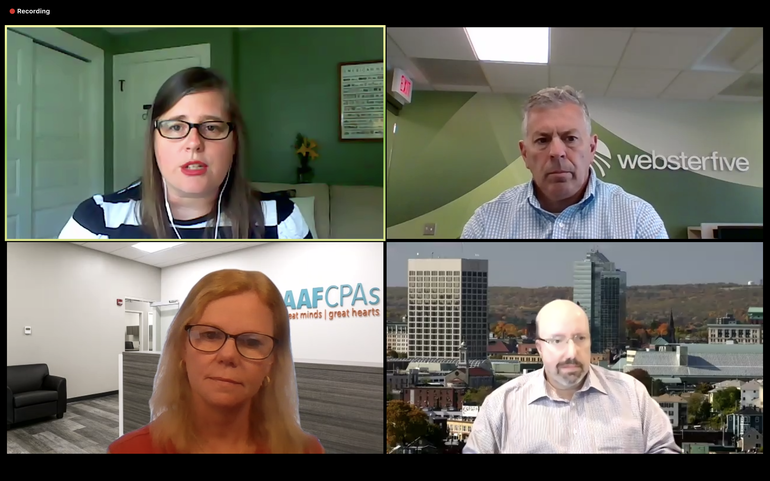As most businesses have received federal Paycheck Protection Program loans, they have to begin looking at other ways to preserve and increase cash flow.
Panelists Leo Correia, CFO and partner at The Delta Group; Jessica Murphy, attorney at Worcester law firm Mirick O’Connell; Chris Watson, senior vice president and senior lending officer business banking division at Webster Five; and Janice O’Reilly, partner at Westborough accounting firm AAFCPAs came together to discuss strategies and precautions businesses should take during WBJ’s ongoing webcast series Coping with COVID-19.
In order to preserve cash, Watson said there are strategies other than PPP loans business owners can utilize are loan deferrals and refinancing.
Regulators have allowed banks to grant two 90-day deferral periods on loans without penalty which relieves both customers and banks.
Another strategy is to look into getting a loan from the Main Street Lending Program.
The Main Street Lending Program went live three weeks ago. It is repayable over a seven-year time period with favorable rates.
The first year does not have payments and the second year’s payments are interest only. The third year is 11 months of interest payments and one month of a 15% principal payment. This turns out to give business three years of breathing room to restructure and reorganize, said Correia.
The government also buys 95% of the loan from banks which results in little risk to banks.
Additional financing options to look into include SBA programs, state resources, and Economic Injury Disaster Loans.
Businesses should also look into regional lending programs and loans to apply to, said O’Reilly.
Most importantly for Correia though is that business owners utilize financial modeling tools to run different scenarios in order to understand what mathematically works best and then redefine business models accordingly.
This recovery stage as Correia put it, where operations and revenue begin to return close to normal, is the period in which business owners can identify new projects and services while looking at restructuring finances.
A strong balance sheet is the new gold standard, said Correia.
In order to get banks to agree to loans, each panelist stressed the importance of increasing transparency between business owners and banks.
Sharing financial information and a road map that shows how a business is going to work in the future allows the bank to be involved in the plans and understand clearly how the loan will help the business.
Best practices to prepare a business for the next quarter include looking at the business’ numbers and revenue in different operational scenarios, establishing payment plans with vendors, and using tools like the 13 week cash flow model.
It is important to take a holistic approach when thinking about decisions because every monetary decision can affect a different part of the business, said O’Reilly.
On the legal side, Murphy said business owners should make sure any agreements between banks are put into writing. Owners should be sure to read modification agreements and fully understand what you need to do and when money is due.
In regards to rent, Murphy said negotiations with landlords are not as automatic as with bank deferrals and it is important to get these agreements in writing as well. Moreover, going through the terms of your lease and spreading out obligations are other important steps to take.
The courts have opened up, so if businesses, banks, or landlords need to get someone to pay through litigation, it is possible. However, Murphy said it’s important to understand the costs of litigation before going down that route.
All the panelists warned hope is not a strategy and businesses should work to understand how they will function with different amounts of cash flow and in various scenarios in order to be prepared for the next few months and the next few years.

